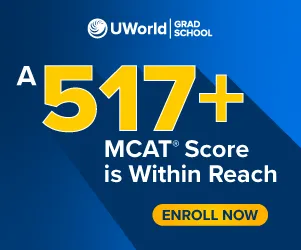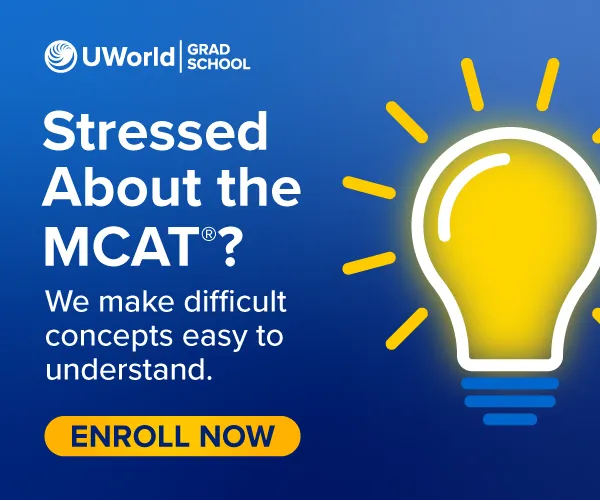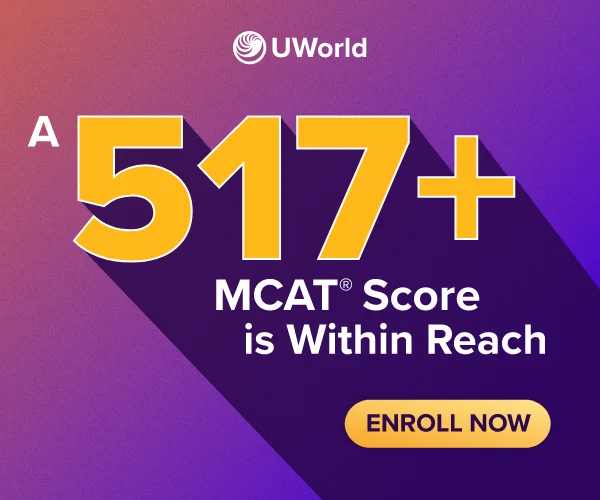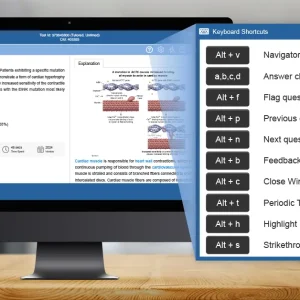Why Your MCAT Study Approach Matters
Your Medical College Admission Test (MCAT®) score can significantly influence your chances of getting into medical school, which is why choosing the best way to study for the MCAT isn’t just helpful; it’s essential. A strong and strategic study plan helps you cover vast content efficiently, retain key concepts, and build the stamina needed for this lengthy exam. Without a structured approach, it’s easy to feel overwhelmed or waste time on less effective methods.
The best MCAT study plan is personalized, yet rooted in a high-quality MCAT prep course and proven strategies. Using the best MCAT prep materials, such as detailed question banks (QBanks), full-length practice exams, and spaced repetition tools, ensures you’re studying smarter, not harder. Whether tackling the critical analysis and reasoning (CARS) section or looking for the best way to study Psychology/Sociology for the MCAT, your method must align with the exam's demands to see real results.
Tips for Studying for the MCAT Successfully
Succeeding on the MCAT requires a balanced approach that combines strong content knowledge, consistent practice, and smart strategies. No matter your background, the best way to study for the MCAT is to build a solid foundation, study actively, and prepare purposefully.
- Build a Consistent Study Routine.
The best MCAT study plans are realistic and sustainable, whether daily or weekly. Remember that consistency is the backbone of every effective study plan, and steady progress over time will consistently outperform last-minute cramming. For a top MCAT score allocate 300-350 hours for MCAT prep and use a resource with an integrated study plan for streamlined review.
- Begin with Thorough Content Review.
Start by mastering core concepts with MCAT prep books written by subject matter experts and video lessons that keep you engaged. The best MCAT study guides will strengthen your foundation and targeted video lessons will help you learn key MCAT concepts. These resources are typically included in MCAT prep courses.
- Use Active Learning Strategies.
Then apply your knowledge with targeted practice and review. Don’t just read — interact. Combine a trusted QBank with flashcards and notes to strengthen understanding and long-term retention. Prioritize reviewing explanations carefully—first-time MCAT test takers often miss this key step.
- Incorporate Practice with Timing.
Once you’ve built confidence with the course material, shift to timed practice. Training under real exam conditions will sharpen your time-management skills, improve efficiency, and make the real exam feel more familiar and manageable. After that, incorporate several full-length MCAT practice exams. Completing and reviewing these exams will help you identify strengths and weaknesses, refine your strategy, and build the stamina needed for test day.
- Balance Intensity with Rest.
Overworking for the MCAT without proper rest leads straight to burnout. Balance your prep with quality sleep, good nutrition, exercise, and downtime. Protecting your energy this way keeps your mind sharp and your study routine sustainable.
Best MCAT Prep Materials
Choosing the best MCAT study materials is one of the most important decisions in your prep journey. From practice books to practice tests, the right combination of tools can elevate your score, especially when tailored to your study style. Here's a breakdown of the top resources across 3 essential categories to help you find your best fit.
Prep Course
| Platform | Strengths | Best For |
|---|---|---|
| UWorld | UBooksTM for content mastery, adaptive study planner, engaging video lessons, 3,000+ high-quality practice questions with detailed answer explanations, digital notebooks and flashcards, integrated AAMC® practice exams and prep hub resources, performance tracking, and mobile app | Students who want a complete prep system that:
|
| Blueprint | Large question bank, video lessons, prep books, live and self-paced course formats, practice tests, study planner and AAMC resources | Learners who prefer visual instruction and flexible study formats |
| Kaplan | Mix of live, on-demand, and self-paced courses with books, videos, practice tests, question bank and AAMC resources | Students looking for a traditional, structured prep |
| Princeton Review | Live and self-paced classes, books, lecture-style videos, QBank, AAMC resources, and focused drills | Students seeking longer lecture style videos and guided prep |
Prep Books
| Platform | Strengths | Best For |
|---|---|---|
| UWorld | Complete set of 8 print + digital review books (6 science and 2 specialized CARS books); includes 4,000+ high-impact visuals, 450 concept-check questions, and built-in tools such as flashcards and digital notebook | Students who want comprehensive and visual content review with interactive functionality for long-term retention |
| Blueprint | Set of books that come with content review, test-taking strategies, and chapter summaries | Learners who prefer a lighter overview with strategy tips |
| Kaplan | Multi-book set with broad subject coverage, practice questions, and test strategies | Students who like a traditional, in-depth review approach |
| Princeton Review | Boxed set of books with subject reviews, strategies, and practice problems | Learners who want in-depth structured study materials with a mix of strategies |
Question Bank
| Platform | Strengths | Best For |
|---|---|---|
| UWorld | Industry-leading QBank with 3,000+ MCAT-style questions with vivid visuals, hyperlinked answer explanations, rationales for all correct and incorrect responses, custom practice tests, progress tracker, and study tools such as flashcards and digital notebooks | Students who want active, smart, and deeply engaging all-around prep with rich study tools and visuals |
| Blueprint | AI-powered QBank with practice questions and performance analytics | Learners who prefer AI-driven personalization and analytics |
| Kaplan | Practice questions, topic-wise quizzes, images, answer explanations, and score reports | Students wanting a high volume of questions, and in-depth explanations from a traditional prep provider |
| Princeton Review | Practice tests and questions, explanations and rationales, and score reports | Students looking for text-heavy structured practice with an exam-like format |
Study Tools
| Platform | Strengths | Best For |
|---|---|---|
| UWorld | Adaptive study planner, digital notebook for note-taking, performance tracking with detailed analytics, spaced-repetition flashcards, mobile app for on-the-go review | Students who want streamlined tools that boost active recall, track progress at every step effectively, and support long-term retention |
| Blueprint | Study planner, AI tutor, flashcards, notebook and performance analytics | Students who prefer organized schedules and data-driven progress monitoring |
| Kaplan | Mobile app, study plan tool, AI tutor, and progress tracker | Students who like structured learning with plenty of digital support |
| Princeton Review | Study timer, AI study recommendation tool and performance analytics | Students who want traditional prep with in-depth performance tools |
Crafting Your Study Schedule: Best MCAT Study Plan
The MCAT demands both depth and endurance, so a structured timeline is crucial. The best MCAT study plan includes breaking your prep into clear and manageable phases to ensure you cover content thoroughly, improve test-taking skills, and stay on track. Here’s a proven 4-phase approach using the best MCAT prep course and study materials at each step.
Phase 1: Foundation Building — Content Review
Start by reviewing all MCAT subjects: General Chemistry, Organic Chemistry, Biology, Biochemistry, Physics, Psychology, Sociology, and CARS. Choose quality MCAT prep books and video lessons to build a strong knowledge base. Prioritize high-yield topics and actively recall key concepts with spaced repetition flashcards and digital notebooks.
Phase 2: Applied Practice — Question Drills & Error Review
After building your foundation, shift your focus to application. Allocate study blocks for QBank questions and practice QBank questions on the go with an MCAT app. Start working with section-specific question sets to test your knowledge and understanding.
Use your QBank to:
- Drill topics systematically to reinforce what you’ve studied.
- Identify weak areas by tracking performance patterns.
- Review every question thoroughly, both correct and incorrect, to uncover reasoning, spot mistakes, and strengthen critical thinking.
Phase 3: Timing & Strategy — Realistic Practice
At this stage, timing becomes your top priority. Simulate real test conditions using a QBank with the exam interface and timed sections:
- Science sections: 59 questions in 95 minutes
- CARS: 53 questions in 90 minutes
Use performance tracking tools from the best MCAT study resources to analyze time per question, pacing patterns, and score trends.
Phase 4: Full-Length Exams & Final Review
In the last 4–6 weeks, shift your focus to full-length exams under official timing. Take at least 4–6 practice tests from the best MCAT study materials. After each test, thoroughly review answers to identify persistent problem areas and adjust your strategy.
Final Thoughts
The best way to study for the MCAT isn’t about following a rigid formula. It’s about creating a plan that works for you. Build a timeline that fits your schedule, balance content review with regular practice, and use the best MCAT study resources to stay focused and efficient. Don’t forget to schedule breaks and rest days; staying sharp is just as important as studying hard.
When it comes to high-impact prep, UWorld stands out as one of the best MCAT prep courses available. It has one of the best MCAT prep books and QBanks, packed with challenging, exam-style questions and in-depth answer explanations that promote true understanding, not just memorization. With built-in flashcards, performance tracking, and customizable quizzes, UWorld supports active learning every step of the way, making it a wise choice for students aiming for top MCAT scores.








